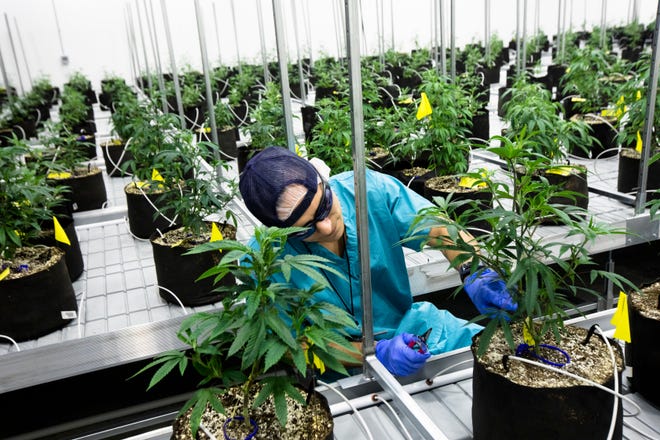

A proposed expansion of Ohio's medical marijuana program would award cultivation licenses to processors that sued the state over previous denials, including one owned by a well-connected Cincinnati businessman with deep roots in the industry.
The provision is just one part of a bill being considered by the Ohio Senate Wednesday that aims to revamp the program and allow doctors to recommend marijuana for any medical condition.
The measure raises questions about whether the bill provides a new path for certain processors to get licensed years after the Ohio Department of Commerce rejected their applications.
For those businesses, though, the legislation offers the chance to grow their own marijuana instead of relying on plants from other companies to make edibles, patches and other products.
"People who know what they’re doing and make good product are in a position to be able to benefit the patients and will clearly benefit from that," said Jimmy Gould, owner of CannAscend Ohio, which is among the businesses that would be granted a license under the bill.
Licenses for rejected applicants
Senate Bill 261, sponsored by Sen. Steve Huffman, R-Tipp City, calls for the first major overhaul of Ohio's medical marijuana program since the state legalized it in 2016.
Huffman's bill would:
- Increase the number of dispensary licenses in Ohio.
- Allow cultivators to expand their facilities.
- Let dispensaries advertise on social media without prior approval.
- Establish a division of marijuana within the commerce department and remove oversight from the Ohio Board of Pharmacy to more efficiently regulate the program.
Most significantly for patients, the proposal would expand the number of ailments that could be treated with marijuana. Physicians could recommend the drug for any patient, regardless of condition, as long as they believe marijuana would help alleviate their symptoms.
Huffman, who is an emergency room physician, and other proponents say the changes will ultimately bring down costs and make marijuana more affordable for patients who need it.
"This will absolutely save the medical marijuana industry," said Gould, who led a failed legalization effort in 2015 and later helped craft the medical program. "If that does not happen, there will be chaos."

Gould's business is one of several that stands to benefit from another part of the bill, which qualifies standalone processors for a new category of cultivation license. These are processors that were rejected in the first round of license applications and obtained a certificate of operation for their facility by Oct. 1.
"You’re finding it hard to have a product or anything to manufacture because a lot of the cultivators are just passing it on to their own manufacturers," Huffman said.
Records indicate this provision applies to at least six processors in the state. Two of them – Gould's CannAscend and One Orijin LLC, owned by Schottenstein Aphria – were both parties in a 2018 lawsuit that accused state officials of unfairly rejecting their cultivator license applications. The companies argued the Ohio Department of Commerce used a broken process that led to inflated scores and failed to weed out conflicts of interest.
The case was eventually dismissed.
Gould said he had input in Huffman's legislation and believes the processor rule will help companies maintain their own brand and manage costs. Ultimately, though, he sees the bill as an opportunity to improve the patient experience.
"If it benefits me or other people like me, it’s a minor part of the bigger picture," Gould said.
Work in progress
Senate lawmakers will consider the bill Wednesday afternoon. When it moves to the House, Huffman plans to push additional changes that didn't get through in time for Wednesday's floor vote.
Among the proposed amendments: Adding lupus to the list of qualifying conditions and clarifying that standalone processors would only be eligible for small-scale, level II cultivation licenses.
Meanwhile, some business owners are frustrated over proposed requirements for how large their grow spaces could be.
Ohio's large-scale, level I cultivators can grow up to 25,000 square feet of marijuana, and level II cultivators are limited to 3,000 square feet. State rules allow licensees to expand to 75,000 square feet and 9,000 square feet, respectively. Huffman's bill would increase expansion for level II growers to 20,000 square feet while leaving level I cultivators at the same limit.
"We don’t see the rationale of why once license class should be singled out for that kind of significant growth," said Andy Rayburn, owner of Buckeye Relief, a level I cultivator near Cleveland.
Rayburn also said the bill should avoid codifying square footage limits altogether and allow the department of commerce to adjust them accordingly when the market changes, as it does now.
"We’ve already got a system built in that works efficiently," he said.
Haley BeMiller is a reporter for the USA TODAY Network Ohio Bureau, which serves the Columbus Dispatch, Cincinnati Enquirer, Akron Beacon Journal and 18 other affiliated news organizations across Ohio.
Source link








